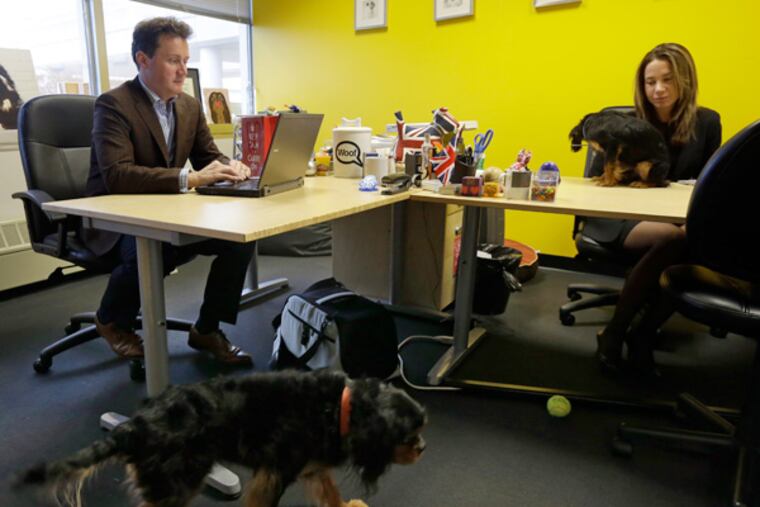Petplan sold to private equity giant; dueling owners exit
Private-equity giant Warburg Pincus buys Petplan, the Newtown Square pet insurer lately a battleground between founders Christopher and Natasha Ashton versus investors led by Moorestown-based banking and real estate operator Vernon Hill.

The struggle for control of Petplan, the pet-insurance sales company based in Newtown Square, has ended with the company’s sale to Warburg Pincus, the New York-based private investment firm.
The sale of the 200-person company, with annual sales of $130 million, paves the way for the departure of its founders — Christopher and Natasha Ashton — and the investor group led by Moorestown banker Vernon Hill.
Terms of the sale weren’t disclosed, but the two sides were pleased enough with the cash to settle two pending lawsuits — a Delaware Chancery Court litigation over the Ashtons’ claim to hold veto power over key decisions at the company that fired them last year, and a Philadelphia Common Pleas Court claim of wrongful termination.
“They built this company from scratch, and they deserve a lot of credit," said Petplan CEO Paul Guyardo.
“We’re very happy to be doing business with Warburg Pincus,” added Guyardo, who was named CEO by Hill’s group in January. The company this summer marked what it said was its 200,000th customer, a 15% increase in customer base from last year.
Guyardo and CFO Mike Kadelski, who previously worked for Hill’s Burger King restaurant group, served as their own investment bankers, overseeing the sale to Warburg while also running the company.
Guyardo and John Giannuzzi, managing general partner of Sherbrooke Capital, will join the board. Giannuzzi, who helped shop the company to prospective buyers, will serve as the new chairman.
Guyardo said Warburg Pincus’ investment is a “game-changer” for Petplan and will accelerate growth, lead to investment in better technology for customers and staff, and add new products.
Warburg Pincus, with more than $65 billion invested, is one of the largest and oldest U.S. private buyout firms. Its properties include a big stake in Allied Universal, the largest U.S. security guard firm, based in Conshohocken and in Santa Ana, Calif., and Petz, a Brazilian veterinary and pet-accessories company. It also owns Texas oil companies. In a statement the company said Petplan would fit with its other insurance businesses. Those include property-casualty insurers and reinsurers such as Foundation Risk Partners, SCM Insurance, McGill & Partners, Arch Capital, RenaissanceRe, and Aeolus Re.
Philadelphia-based Cozen O’Connor served as the legal adviser to Petplan; Wachtell, Lipton, Rosen & Katz of New York advised Warburg Pincus.
Months leading up to the sale were marked by an acrimonious court battle between the founders and Hill.
During testimony in a Delaware court, Hill, whose coinvestors included hedge fund billionaire Steven A. Cohen, recounted how he backed the Ashtons after meeting the British couple when they were students at the Wharton School in the early 2000s. But Hill added that he soured on the pair in recent years as Petplan sales flattened.
The Ashtons, in their testimony, accused Hill and other investors of deceiving them about their intentions for themselves and the company. Before the settlement, Christopher Ashton said the couple had accepted they would likely have to leave Petplan and were considering starting another pet-related business.
Hill earlier this year stepped down as chairman of Metro Bank Plc, a British bank he founded, after it lost more than 90% of its share value. He remains chairman of Philadelphia-based Republic Bank’s parent company.
Guyardo’s team has returned Petplan to profitability, in part by implementing changes its insurance partners recommended that the Ashtons resisted, including charging the owners of old and sick pets more after multiple claims.
That policy has sparked a reaction among customers like Bob Kach, who operates a Pittsburgh-area pet service.
“I’ve been with Petplan since my dog was 5,” Kach wrote in an email to The Inquirer. He said he “religiously” renewed a plan covering 90% of vet bills — “no limit” — and a $200 deductible per condition. But after his dog, Rocco, turned 13 and was diagnosed with bladder cancer, “to my surprise” the company limited payouts for Rocco to $15,000 a year, cut payments to 80%, and increased the deductible to $350.
“I was infuriated” that the cost for a premium plan went up when it was needed, Kach added. But he said a Pennsylvania Insurance Department review of the policy found no technical violations. He said he is considering a lawsuit, and added that Petplan has renewed his cat policy.
“You have to set the expectations" when a policy is first sold, said Guyardo when asked about how the company handles policy change complaints. "We are now very transparent about the fact your policies and conditions can change upon renewal.”